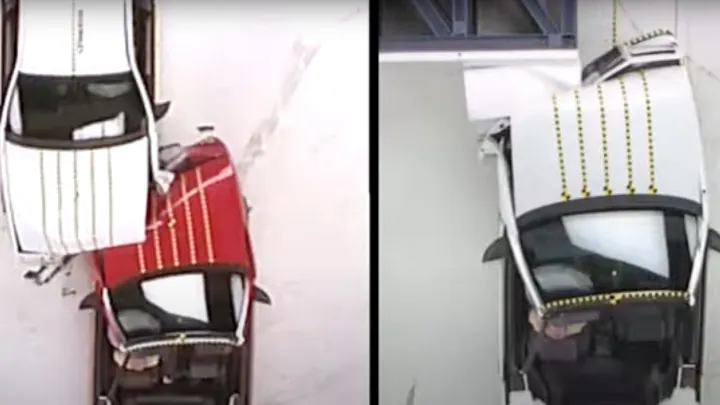IIHS: Here's Why We Don't Crash Test at More Than 40 MPH

The Insurance Institute for Highway Safety occasionally updates its testing methods to keep pace with a rapidly evolving automotive industry, but there’s one thing that hasn’t changed with the new tests: Crash speeds. In a recent YouTube video, the IIHS detailed why it hasn’t increased crash-test speeds above 40 mph despite the fact that most highway drivers routinely hit much higher speeds.
Raul Arelaez, the VP of the IIHS Vehicle Research Center, said that the organization's testing speeds align with the median speed of real-world crashes involving severe injuries.
“We know there are crashes that are more severe, but we are capturing the bulk of the total number of crashes. Most crashes are very low severity,” he said in the video.
Another reason for keeping speeds where they are is the fact that impact force doesn’t increase in a linear relationship with speed. Arbelaez pointed out that increasing speeds from 40 to 50 mph would bump crash energy by 50 percent and said that focusing on higher crash-test speeds could come at the expense of safety at lower speeds.
The IIHS updated its testing methodology in 2024, making it more difficult for vehicles to earn a Top Safety Pick or Top Safety Pick +. Pedestrian and crash prevention systems must now perform well in both day and nighttime, while headlights have to earn “Good” or “Acceptable” scores for the vehicle to qualify for an award. Additionally, the organization recently released a report showing that most advanced and semi-autonomous driving assistance systems fail to adequately monitor driver behavior and safety.
[Image: IIHS via YouTube]
Become a TTAC insider. Get the latest news, features, TTAC takes, and everything else that gets to the truth about cars first by subscribing to our newsletter.

Chris grew up in, under, and around cars, but took the long way around to becoming an automotive writer. After a career in technology consulting and a trip through business school, Chris began writing about the automotive industry as a way to reconnect with his passion and get behind the wheel of a new car every week. He focuses on taking complex industry stories and making them digestible by any reader. Just don’t expect him to stay away from high-mileage Porsches.
More by Chris Teague
Latest Car Reviews
Read moreLatest Product Reviews
Read moreRecent Comments
- SCE to AUX They're spending billions on this venture, so I hope so.Investing during a lull in the EV market seems like a smart move - "buy low, sell high" and all that.Key for Honda will be achieving high efficiency in its EVs, something not everybody can do.
- ChristianWimmer It might be overpriced for most, but probably not for the affluent city-dwellers who these are targeted at - we have tons of them in Munich where I live so I “get it”. I just think these look so terribly cheap and weird from a design POV.
- NotMyCircusNotMyMonkeys so many people here fellating musks fat sack, or hodling the baggies for TSLA. which are you?
- Kwik_Shift_Pro4X Canadians are able to win?
- Doc423 More over-priced, unreliable garbage from Mini Cooper/BMW.


































Comments
Join the conversation
One can not call or even email this worthless organ.
I'm not sure I entirely get this. Locally, when I see most of the major injuries and deaths in an accident, it's a drunk driver going the wrong way on a freeway going 60mph that fails to stop or even slow down. Wouldn't it be a good idea for car companies to invest in saving lives at higher speeds?